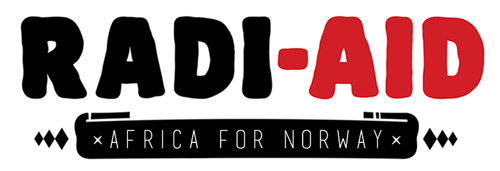Why donate your stereotypes?
OK, we're messing with you again. Who Wants to Be A Volunteer is – at least so far - not a reality show, and Africa is still not a country.
But in our video, did you recognize any familiar stereotypes about the African continent tends to be portrayed, and the image of the “white hero” and the “exotic other”?
Below we will explain more about the idea behind the Rusty Radiator Awards.
1) Why this campaign?
If we say Africa, what do you think about? Hunger, poverty, crime or AIDS? For decades now, we’ve seen the same stereotypical images of Africa in both the media and in fundraising campaigns. It reinforces the image of Africans as an “exotic other”. We believe that these images create apathy, rather than action. We need to educate ourselves on how stereotypes and simple solutions to complex problems are more damaging, than helping. SAIH wishes to create a bigger understanding for how a certain kind of communication can be harmful. That was also our starting point when we made Radi-Aid: Africa for Norway in 2012.
2) Why are stereotypes damaging?
Hunger and poverty is ugly, and it calls for action. However, we need to create engagement built on knowledge, not stereotypes. For instance, a survey published by the British development organization Oxfam shows that three out of four people had become apathetic of images showing hunger, drought and disease. The stereotypical images from fundraising ads and the nominees for the Rusty category are constantly feeding us to believe that we – the “Westerners” – are the ones who can save the world. In many ways, this also undermines the long line of politic-areas that also are relevant for development politics. Some examples are debt, responsible investments, worker rights, tax haven, climate politics, tourism and trade policies.
3) In this year’s video – are we criticizing volunteers?
No, this is not a critique against the millions of volunteers engaging every year in voluntary work in developing countries. The idealism and engagement makes the world go around. However, this video is the third in a series of videos where we use satire to illustrate the perception many people have of Africa, as well as the solution to the problems. Volunteerism is just yet another example of how we “the “Westerners” – are helping out, without looking into the real reasons and structures which upholds an uneven world.
4) How can fundraising campaigns become better?
- Let people tell their own stories.
- Tear down stereotypes; concentrate more on what makes us equal, rather than our differences. See for instance Mama Hope's Women of Nyamonge and African Man videos.
- Remember it's not about what you think people should want or have or do. If you wish to help someone, it should be based on their wishes and needs. A great spoof on this is Tim's revolutionary one-to-one campaign to Blend out Poverty.
- Be creative! For instance by using humor, people are triggered to think for themselves and motivated to act, without us having to tell them to. Campaigns like Radi-Aid: Africa for Norway and What has aid ever done for anyone? have received massive attention and got people talking.
- Do not focus too much on the single story. By this, we mean that too often fundraising campaigns tell the story of one nameless individual's person sad story. What we want to see is more information about why poverty exists, and what is our role in it? See for instance Glen, Gary and Ross - a film about land grab and the great spoof Drive Aid.



